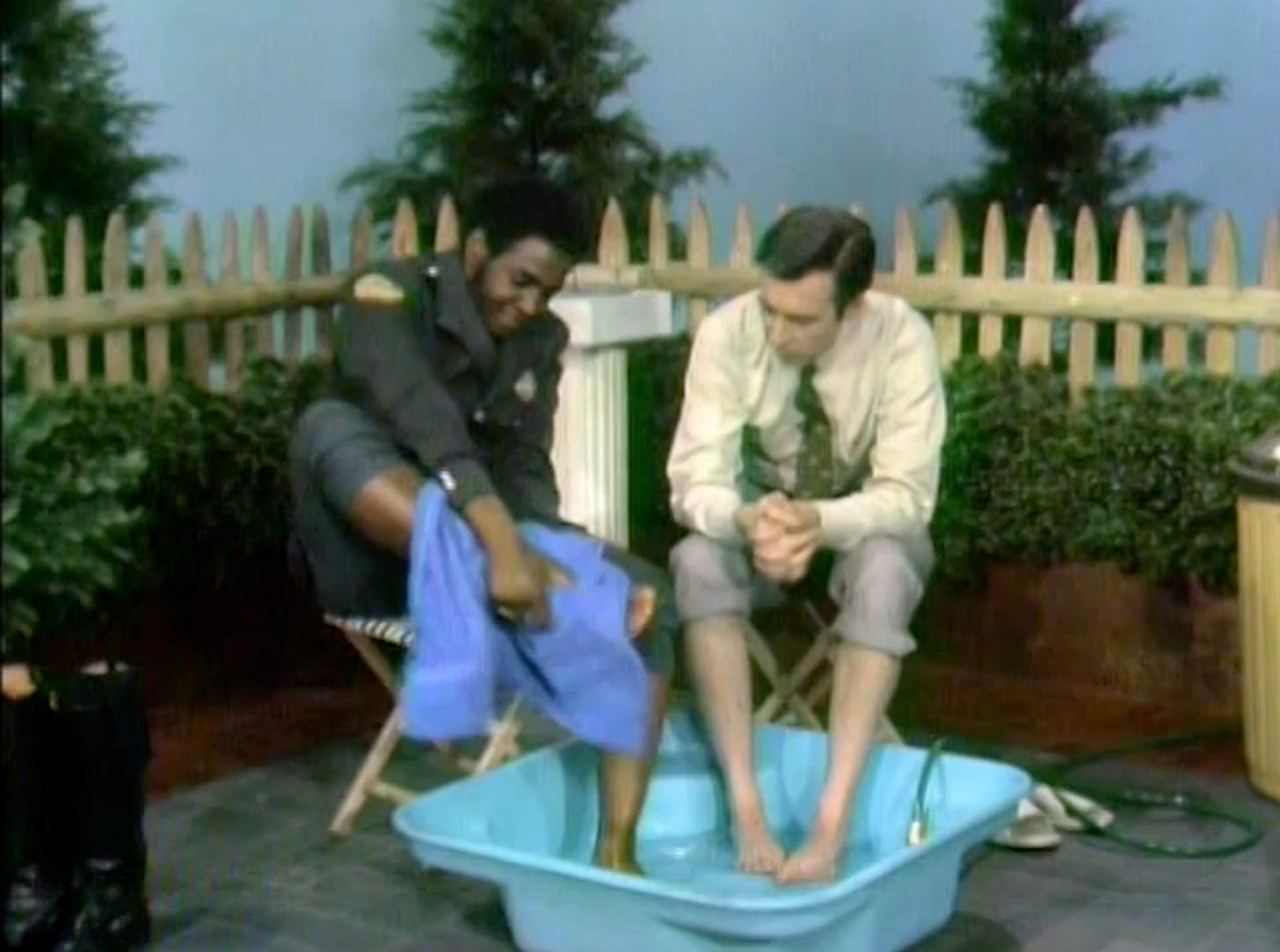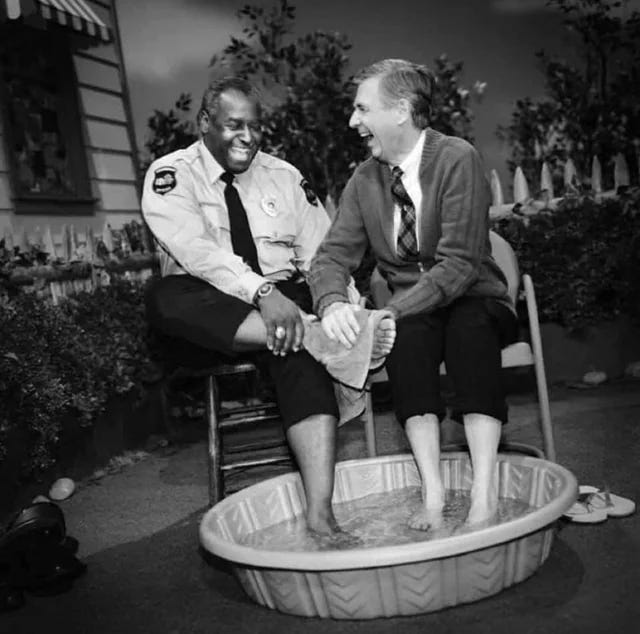On May 9th, 1969, in the midst of ongoing tensions about segregated swimming pools, Fred Rogers did something simple yet moving on an episode of Mr. Rogers’ Neighborhood. He invited a Black police officer played by François Clemmons to dip his feet in a pool with him.
It’s easy to forget how severe tensions were at the time. Steeped in racism, some people threw nails into pools and beat up Black people who tried to swim with them. In one instance a hotel manager in Florida got so angry he dumped acid in the hotel pool when he saw a Black family swimming in it.
Like so much of what Mr. Rogers did on his TV program, the moment with François Clemmons subtly referenced his Christian faith without giving any sense of superiority. It called attention to the importance of the second great commandment, to love your neighbor.
It also alluded to a verse from the Sermon on the Mount: “Be ye therefore perfect, even as your Father which is in heaven is perfect.”
At first glance, this connection might seem like a stretch. How is dipping your feet in a pool connected to being perfect?
Back in high school, I memorized “be ye perfect” as part of the scripture mastery program for my Latter-day Saint seminary class. At the time, I assumed it was a command to never have a sexy thought. (Not great for someone with scrupulous tendencies!) I didn’t realize it back then, but I had overlooked a crucial word in the verse: Therefore.
“Be ye therefore perfect.”
Therefore points to the verses that precede it, verses that talk about how God’s love is perfect, universal, for all people—just like the rain and the rays of the sun.
Given this, a paraphrase of the passage might read:
You have heard that it has been said that you should love provincially—that you should only love people who are part of your tribe. But I say that you should love all people, just as God sends rain and sunshine to all people. You should therefore love universally like God does.
This is the subtle message behind Mr. Rogers putting his feet in the pool: Our love should be for everyone.1
Of course, if you sit with these verses long enough, you realize that the message is even more troubling, challenging, and uncomfortable than I’ve portrayed it above. This is perhaps most immediately clear in the Contemporary English Version of the Bible, which reads:
“You have heard people say, ‘Love your neighbors and hate your enemies.’ But I tell you to love your enemies and pray for anyone who mistreats you. Then you will be acting like your Father in heaven. He makes the sun rise on both good and bad people. And he sends rain for the ones who do right and for the ones who do wrong.
If you love only those people who love you, will God reward you for this? Even tax collectors love their friends. If you greet only your friends, what's so great about this? Don't even unbelievers do that? But you must always act like your Father in heaven.”
Again, there is the call to love everyone just as God sends rain on everyone. But there is also a call to specifically love “bad people” and “the ones who do wrong” (or the evil and the unjust, as it says in the King James Version).
So the passage isn’t only saying to do what Fred Rogers did by putting his feet in a pool with a friendly neighbor. It’s also saying—as difficult and uncomfortable and perhaps nearly impossible as it may be—to love those who do wrong.
It’s saying to love the hotel manager who dumped acid in the pool.
Loving an oppressor like that might feel like a step beyond the pale. How can we love someone who did something so horrific?
Martin Luther King, Jr. spoke of this universal love during his fight for civil rights. “What do you mean,” he asked rhetorically, “when you say love those who are oppressing you and love those who are exploiting you and those who are violently seeking to destroy you? Certainly when I talk about love at this point I am not talking about emotional bosh. I am not talking about some sentimental or even some affectionate emotion. I am talking about something much deeper.”
For Martin Luther King, Jr., this love entailed seeing the fullness of every human being. He says that the oppressor (the type of person who would dump acid in a pool) is acting from the fear instilled in him from his cultural upbringing. “At times his school taught him that way,” King says. “At times his church taught him that way. At times his family taught him that way. And the thing to do is to change the structure and the evil system, so that he can grow and develop as a mature individual devoid of prejudice. And this is the kind of understanding and goodwill that the nonviolent resister can follow if he is true to the love ethic.”
We must each face the uncomfortable reality that if we had been raised the same way as an oppressor, chances would be higher that we too would behave like an oppressor, despite our agency to choose otherwise. And if we did, we would also likely be convinced that our actions were justified.
If this were the case, how would we ever change? Only by being seen fully for who we were, who we are, and who we might become—past, present, and future. Only then might we feel soft enough to change.
Seeing someone fully like this is not a weak position. It takes strength to see a person’s past. It takes strength to imagine redemptive futures. It takes strength to fight a corrupt system while loving the people ensnared in it, oppressed and oppressor alike.
It also takes strength to love universally and still demand accountability. I mean, we can understand the hotel manager’s life circumstances and also put him in jail. After all, in its full expression universal love encompasses the actions of justice. (This might have been another subtle reference from Fred Rogers, who sat next to Officer Clemmons, dressed in full uniform—suggesting the need for restorative justice.)
Today our conflicts and divisions are wide and varied. Religious vs. secular, believers vs doubters, right vs. left, old vs. young, etc. There’s a strong pull to choose your team and create purity tests—to claim that those who don’t agree with you are a “them” and that only those who are on your team are pure.
But when you see yourself and others fully, you realize that there ultimately are no teams. “The line separating good and evil passes not through states, nor between classes, nor between political parties either,” writes Russian author Aleksandr Solzhenitsyn, “but right through every human heart—and through all human hearts.” There is only endless complexity unfolding inside and between each of us, an ever-shifting blend of good and bad—a hope for a brighter future together.
And still the rain keeps falling and the sun keeps shining on us all.
Jon Ogden is a Wayfare Senior Editor and co-Founder at UpliftKids.org, a lesson library and curriculum for families to explore wisdom and timeless values together.
KEEP READING
It’s also worth noting that the Greek word that gets translated as perfect in most English translations is teleioj, a form of telos, which refers to the ultimate purpose of a thing. For instance, the telos of a grain of corn is to grow into a plant that produces ears of corn. With this in mind, another translation of the verse might be “grow up and love universally, as God loves universally.”








Jon Ogden thank you for being you. I am scrupulous too. I recognize so much light and so much shadow in living with it. Amen to this beautiful read. On a humorous note, my kids are getting those funny jersey-type shirts this Christmas (as gifts) that say “Go Sports! Do the thing Win the points.” Subtle and fun way to say a great many things including “there are no teams.”
Loved this read…especially today.